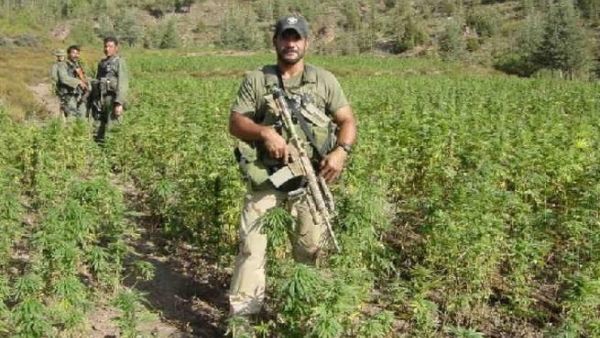When her father abandoned the cultivation of hashish plants, the little girl knew what it felt like to “starve half to death.” That was 20 years ago, when her father decided to make do with his salary as a policeman, giving in to his fear of military checkpoints which, at the time, were manned by “joint” forces.
Perhaps that decision, which her father, after his “repentance,” believed to be the right one, was indeed wise. It was preceded by many a terrifying experience, including an hour in a police vehicle when he was picked up from his home one cold night. That day, he thought he was done for because of his hashish plants. So then and there he decided to stop cultivating cannabis.
Today, however, there is a sense of nostalgia for those long gone days, all of which is left are little stories about the difficulty of smuggling a truck loaded with hashish through side streets and byways. A trip that normally takes half an hour would take more than three, as the truck driver had to drive without lights. The constant companion during these hours was fear of a bust.
Nostalgia is often revived in September and part of October, especially with the first rain that used to spread the smell of the plants
that had just been stripped of the hashish buds.This nostalgia is often revived in September and part of October, especially with the first rain that used to spread the smell of the plants that had just been stripped of the hashish buds.
When her father abandoned hashish cultivation, the smell pervaded in her hometown for years before most people also “repented.” Even then, hashish still remained a semi-normal yearly ritual there. The only thing that suppressed this feeling of normalcy were the occasional busts, which were often unsuccessful because growers were very cautious. Besides, some of those on patrol were in collusion with the residents, especially since most of the growers had served in the military.
The smell lingers to this day. Hashish is associated with a time when hunger was not a familiar reality. Perhaps people who lived through those times remember the taste of cannabis infused sesame cookies and the taste of tea boiled on a cannabis fire.
Despite its illegality in the eyes of the state, hashish aids the poor by supplementing their income at a time when the state does not. No one used to worry around this time about school fees or books or new clothes for school or the price of eggplants for winter provisions or the price of diesel for heating.
The girl remembers that her father did not feel the kind of strain he felt when he decided to “retire” from hashish cultivation. He came to depend solely on his police pension which was supposed to cover school fees, food provisions, household expenses and everything else.
At that point, buying stationery for school felt like a luxury and the diesel supply had to be bought in “installments, drop by drop.”When her father retired from the military more than 20 years later, he could not help but notice that his pension was less than the returns of two hashish seasons.
In the Baalbeck-Hermel area, nothing compensates for hashish cultivation. Nothing saves families from poverty except a few kilos of hashish – neither apples nor the alternative crops that the government promised. There is nothing here other than hashish in an area where half of the residents are farmers who do not have the money to cultivate another crop - which would be unprofitable anyway - and the other half are in the military, but those too are hashish growers.
There is something painful about destroying the hashish that we see today for those who did not retire from the cultivation of the only and most prominent crop. The government does not show up in the area except to destroy their livelihood. Who will remind the government that those people are not criminals nor bandits nor amateur illegal crop growers? They only demand the right to live. They cultivate hashish so they can put their children through schools and universities whose fees and fee hikes equal a soldier’s entire pension.
Who will remind the government that its alternative crops do not feed the hungry because no one buys them. As for the hashish, the growers know that “state officials will buy it!”
Should the hashish farms be shut down? What about the farmers and their income? Tell us your thoughts below.








